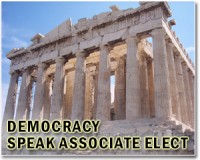 |
Yangon, Myanmar (UPI) Nov 15, 2010 Released Myanmar democracy advocate Aung San Suu Kyi told supporters to keep the faith and urged the junta leader to talk to her directly. Suu Kyi's release Saturday ended several days of speculation about her imminent freedom, coming just after military rulers had the first national election in nearly 20 years. Suu Kyi, the 1991 Nobel Peace Prize laureate and head of the National League for Democracy Party, won the last election in 1990 but the junta failed to hand over power. She was barred from running in the recent election by a law created by the generals in April. She was mobbed by supporters and well-wishers upon release from her home in Yangon, the country's largest city and the former capital of Myanmar, called Burma before a name change by the junta. "Please let us know what you are thinking, what is on your mind. I would like to know over the last six years what changes have taken place in the people and what they are thinking," she said. "Please do not give up hope. There is no reason to lose heart, even if you are not political, politics will come to you." Later, at a news conference at the head office of the NLD, she reiterated her belief that there is a future for her party, although it didn't contest the controversial election in which a pro-junta party won. "I did not found the National League for Democracy just as a party," she said. "I founded it as a movement for democracy, an organization for change. As long as the people want democracy in Burma the organization will exist. We are trying to achieve it as quickly as possible, but I do not know how long it will take to get democracy." Suu Kyi also said she is ready to talk to the junta leader, Senior Gen. Than Shwe, saying "let's speak to each other directly." Her release marks her continued effort to push the military toward allowing a more open and democratic society. She said she also is concerned over economic sanctions that Western nations have placed on Myanmar. "If the people really want sanctions to be lifted, I will consider it," she said. "This is the time that Burma needs help." Her release was greeted by many Western leaders, including U.S. President Barack Obama, and non-government organizations, who have criticized the election as not being free and democratic. Obama said Suu Kyi's release was "long overdue" and that "she is a hero of mine." U.N. Secretary-General Ban Ki-moon said she was an "inspiration." Moon, as did many NGOs, urged Myanmar to free what is believed to be around 2,200 political prisoners. Western leaders considered Suu Kyi a political prisoner. But the junta hurriedly passed a law earlier this year that barred people with criminal records from standing for office. The move excluded Suu Kyi who has spent many of the past 20 years under some form of arrest and detention for her pro-democracy activities. Because Suu Kyi was barred from running, her party decided not to register for the election, although a splinter group registered itself. The NLD is no longer an officially recognized party because it didn't register. Her release means the party must decide how it wants to reorganize and what it can do to bring about more democracy, she said. But she stopped short of urging civil disobedience and told the thousands of her supporters to work together. "We Burmese tend to believe in fate but if we want change we have to do it ourselves," she said. "Nothing can be achieved without the participation of the people." She also said she would work "with all democratic forces" for a national reconciliation. Suu Kyi said she wasn't abused in captivity and had no grudges against her jailers. "They treated me well," she said. "I only wish they treated the people in the same way." The election was won by former Gen. Thein Sein who heads the Union Solidarity and Development Party, considered a proxy for the ruling junta. Prior to the election, many senior junta officials in government resigned their military posts, joined the USDP and ran as civilians. The win by the USDP -- it took around 80 seats -- and also the 25 percent of parliamentary seats reserved for junta appointees, means the military likely will continue with its stranglehold on government for years to come. Two of the largest anti-government parties claimed civil servants were forced to vote for the USDP. The largest anti-government party, the National Democratic Force, took 16 seats, nearly all in Yangon. It remains to be seen if the USDP will include any military appointees in its Cabinet.
Share This Article With Planet Earth
Related Links Democracy in the 21st century at TerraDaily.com
 Obama, US lawmakers face year-end fights
Obama, US lawmakers face year-end fightsWashington (AFP) Nov 15, 2010 President Barack Obama faced fired-up Republican foes as the US Congress returned to work Monday to face off on tax cuts, government spending and a landmark nuclear treaty with Russia. Two weeks after voters thrashed his Democrats, costing them Senate seats and control of the House of Representatives, Obama promised a shift from an "obsessive focus" on his agenda to a kinder, gentler politic ... read more |
|
| The content herein, unless otherwise known to be public domain, are Copyright 1995-2010 - SpaceDaily. AFP and UPI Wire Stories are copyright Agence France-Presse and United Press International. ESA Portal Reports are copyright European Space Agency. All NASA sourced material is public domain. Additional copyrights may apply in whole or part to other bona fide parties. Advertising does not imply endorsement,agreement or approval of any opinions, statements or information provided by SpaceDaily on any Web page published or hosted by SpaceDaily. Privacy Statement |